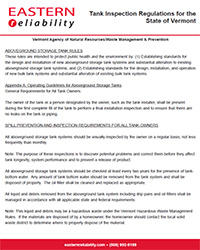Tank Inspection Regulations for the State of Vermont
Vermont Agency of Natural Resources/Waste Management & Prevention
Aboveground Storage Tank Rules
These rules are intended to protect public health and the environment by: (1) Establishing standards for the design and installation of new aboveground storage tank systems and substantial alteration to existing aboveground storage tank systems; and (2) Establishing standards for the design, installation, and operation of new bulk tank systems and substantial alteration of existing bulk tank systems.
Appendix A: Operating Guidelines for Aboveground Storage Tanks
General Requirements for All Tank Owners:
The owner of the tank or a person designated by the owner, such as the tank installer, shall be present during the first complete fill of the tank to perform a final installation inspection and to ensure that there are no leaks on the tank or piping.
Spill Prevention and Inspection Requirements for all Tank Owners
All aboveground storage tank systems should be visually inspected by the owner on a regular basis, not less frequently than monthly.
Note: The purpose of these inspections is to discover potential problems and correct them before they affect tank longevity, system performance and to prevent a release of product.
All aboveground storage tank systems should be checked at least every two years for the presence of tank bottom water. Any amount of tank bottom water should be removed from the tank system and shall be disposed of properly. The oil filter shall be cleaned and replaced as appropriate.
All liquid and debris removed from the aboveground tank system including drip pans and oil filters shall be managed in accordance with all applicable state and federal requirements.
Note: This liquid and debris may be a hazardous waste under the Vermont Hazardous Waste Management Rules. If the materials are disposed of by a homeowner, the homeowner should contact the local solid waste district to determine where to properly dispose of the material.
Additional Spill Prevention and Inspection Requirements for Fuel Suppliers
All tank systems should be inspected by a fuel supplier or qualified technician prior to the initial delivery to the system and when the tank owner switches fuel suppliers. A checklist provided or approved by the Agency of Natural Resources (or a checklist preapproved by the Secretary) shall be completed prior to the fuel delivery. Any problems identified in the inspection which indicates the potential for a fuel release must be corrected before the fuel delivery.
During fuel delivery, the vent alarm should be properly working. If the vent alarm does not whistle the delivery should stop immediately and not resume until the reason is determined and corrected. After fuel delivery, the visible components of tank system should be visibly inspected to ensure no product has been released from the system.
The condition of all aboveground storage tanks should be inspected at least once every 2 years by a person certified in accordance with section 1.13 of the Vermont Fire & Building Safety Code. For steel tanks, this could include testing the tank thickness using an ultrasonic test to determine if internal corrosion has compromised the tank. The fuel pipe should be tagged by the fuel company to verify inspection and date. A fuel company that determines a tank is unsafe and non-compliant under these rules should be “red-tagged” in the same way a heating service technician can “red tag” a furnace. Red tagging a tank will indicate that the tank is out of compliance and that the fuel dealer declined to fill the tank due to environmental risk. The fuel company shall report to the Agency of Natural Resources any tank that is “red-tagged” and shall identify the reason why the tank is “red-tagged.” The Agency will maintain a database of “red-tagged” tanks that will be accessible to the public.
All fuel oil heating appliances with an oil line beneath grade should be equipped with an oil safety valve.
Additional Spill Prevention and Inspection Requirements for Bulk Facilities
Aboveground Bulk Storage Facility. All aboveground bulk storage facilities shall have an up-to-date Spill Prevention Control and Countermeasure (SPCC) plan.
Need Your Tank Inspected?
Eastern Reliability can provide primary tank inspection services and works with several regional partners to provide timely, economical, yet very detailed tank inspection services that will meet all regulatory requirements. Inspection personnel have the industry experience, all safety training and professional certifications required for inspectional services.
Please contact us to schedule your chemical tank inspection.
Need Your Tank Inspected?
Fill out our form below and we will contact you shortly to schedule a date for your chemical tank inspection.

